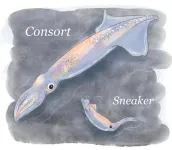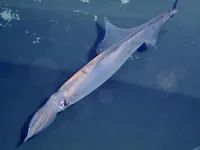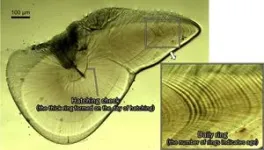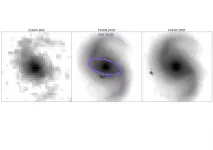(Press-News.org) The day a male spear squid hatches determines which mating tactic he will use throughout his life, according to new research. Spear squid (Heterololigo bleekeri) that hatch earlier in the season become “consorts” which fight for mating opportunities. Those which hatch later become “sneakers,” which use more clandestine mating tactics. Researchers found that the mating tactic determined by the birth date was fixed for the squid’s whole life. Understanding how mating tactics are influenced by birth date, and the environmental conditions at that time, can help researchers consider how squid might be affected by climate change and the implications for marine resource management.
What does your date of birth say about you? Maybe you feel it reveals something about your personality, or perhaps even your destiny. For male spear squid, it can tell us a lot about their love life!
A team of researchers in Japan have found that the mating tactics of Spear squid are heavily influenced by the day they were born. These squid can be classified into two types according to their mating techniques: consorts, which fight off rivals to place their sperm inside a female and then guard her while she lays her eggs; and sneakers, which, as the name implies, steal mating opportunities by covertly depositing their sperm on the outside of a female near where she lays her eggs, in the hope of fertilizing them.
Interestingly, this study found that once a squid mating tactic had been determined by their birth date, they stuck with it. Male squid born between early April and mid-July grow large before starting reproduction and become consorts. Squid which hatch later, between early June and mid-August, are smaller when mating season begins and become sneakers. However, even if an early-born squid grew large enough to become a sneaker in the early breeding season, he would postpone maturing and continue growing until he becomes large enough to be a consort. Squid born in early July had a fifty-fifty chance of using either tactic.
“Our results showed that the hatching date determines the whole life trajectory in this species,” said Associate Professor Yoko Iwata from the Atmosphere and Ocean Research Institute at the University of Tokyo. “The difference in hatch date means that the squid experience different environmental conditions in early life, which may influence the growth trajectory. If an extreme environmental event, such as an ocean heat wave, happens during the hatching season, it could affect the squid’s mature body size and subsequent mating tactic. This would also impact the amount that could be commercially caught enormously.”
In total, the team analyzed over 350 squid, which they either caught themselves or took from commercial catch between 2020 and 2023. These are the first reported results which support the “birth date hypothesis” in an aquatic invertebrate. This hypothesis proposes that date of birth influences a male’s reproductive tactics and had previously only been recorded in fish. This new discovery suggests that it may actually occur in a wider variety of animals than previously thought.
One surprising find was that the growth rate of the squid differed to what the team expected. Previous studies have shown that squid are very sensitive to environmental conditions, particularly water temperature. So, the team expected to see this influence squid growth. However, results showed that the growth rate early in life was not so different between consorts and sneakers, even though they grew up during different seasons. This raises new questions about what else may be affecting spear squid growth and reproduction, which the researchers think may be down to a complex mix of environmental factors.
Now the team is analyzing a structure inside the squid called the statolith. Statoliths grow daily and were used in the current study to estimate a squid’s age by counting the number of layers, similar to tree-ring dating. In addition to estimating age, microelements contained within the statolith can be used to estimate the ocean condition experienced by the squid at the time that part of the statolith developed. For example, the element strontium can be used to estimate experienced water temperature. By analyzing these microelements, the researchers want to determine what environments individual squid experienced throughout their early life and create a clearer picture of how this might have influenced their mating tactics.
“I am interested in the evolution of animal survival and reproduction strategies, in other words, its life history; and also phenotypic plasticity, that is, how individuals respond to environmental changes,” said Iwata. “For several reasons I think that spear squid are an ideal organism to study how environmental and ecological conditions can affect life history.”
####
Paper Title
Shota Hosono, Yoshio Masuda, Shun Tokioka, Tomohiko Kawamura and Yoko Iwata. Squid male alternative reproductive tactics are determined by birth date. Proceedings of the Royal Society B. 24 April 2024. DOI: https://doi.org/10.1098/rspb.2024.0156
Useful Links:
Atmosphere and Ocean Research Institute: https://www.aori.u-tokyo.ac.jp/english/
Yoko Iwata ResearchGate: https://www.researchgate.net/profile/Yoko-Iwata
Shota Hosono ResearchGate: https://www.researchgate.net/profile/Shota-Hosono
Funding:
This study was supported by a Japan Society for the Promotion of Science KAKENHI grant for scientific research (19H03029) to YI, a grant from Yanmar Environmental Sustainability Support Association to SH, and the research and assessment program for fisheries resources, the Fisheries Agency of Japan, to ST.
Competing interests
None
Research Contact:
Associate Professor Yoko Iwata
Atmosphere and Ocean Research Institute,
The University of Tokyo, Kashiwa, Chiba, Japan
Tel.: +81-4-7136-6261
Email: iwayou@aori.u-tokyo.ac.jp
Press contact:
Mrs. Nicola Burghall (she/her)
Public Relations Group, The University of Tokyo,
7-3-1 Hongo, Bunkyo-ku, Tokyo 113-8654, Japan
press-releases.adm@gs.mail.u-tokyo.ac.jp
About the University of Tokyo
The University of Tokyo is Japan’s leading university and one of the world’s top research universities. The vast research output of some 6,000 researchers is published in the world’s top journals across the arts and sciences. Our vibrant student body of around 15,000 undergraduate and 15,000 graduate students includes over 4,000 international students. Find out more at www.u-tokyo.ac.jp/en/ or follow us on X at @UTokyo_News_en.
END
Squids’ birthday influences mating
Male spear squids become “sneakers” or “consorts” depending on when they were born, and stay that way
2024-04-24
ELSE PRESS RELEASES FROM THIS DATE:
Star bars show Universe’s early galaxies evolved much faster than previously thought
2024-04-24
Embargoed until 00:01am BST on Wednesday 24 April 2024/19.01pm ET on Tuesday 23 April 2024
-With pictures-
The Universe’s early galaxies were less chaotic and developed much faster than previously thought, according to new research looking back more than ten billion years in time.
An international team of astronomers led by Durham University, UK, used the James Webb Space Telescope (JWST) to find evidence of bar formation when the Universe was only a few billion years old.
Bars are elongated strips of stars found in disc or ...
Critical minerals recovery from electronic waste
2024-04-24
RICHLAND, Wash.—There’s some irony in the fact that devices that seem indispensable to modern life—mobile phones, personal computers, and anything battery-powered—depend entirely on minerals extracted from mining, one of the most ancient of human industries. Once their usefulness is spent, we typically return these objects to the Earth in landfills, by the millions.
But what if we could “mine” electronic waste (e-waste), recovering the useful minerals contained within them, instead of throwing them away? A clever method of recovering valuable minerals from e-waste, developed by a research team at the Department ...
The move by Apple Memories to block potentially upsetting content illustrates Big Tech’s reach and limits, writes Chrys Vilvang
2024-04-23
How do algorithms determine the way we interact with our memories?
It’s a uniquely 21st-century kind of question, and it is far from settled.
In a new paper in the journal Memory, Mind & Media, Concordia PhD candidate Chrys Vilvang argues that the way tech companies store, package and share personal content back to users is opaque. And, given one recent controversy, it’s open to important questions about selection and representation.
Vilvang’s paper looks at the discussion stemming from an April 2022 article on 9to5Mac, a tech news site dedicated to all things Apple. Its journalists were given access to the iOS 15.5 beta update, and they discovered ...
Chemical tool illuminates pathways used by dopamine, opioids and other neuronal signals
2024-04-23
Image
University of Michigan researchers have developed a new tool to better understand how chemicals like dopamine and epinephrine interact with neurons.
These chemicals are among a wide variety of signals that get processed in the brain through G protein-coupled receptors (GPCRs), proteins that sit on the surface of neurons to receive messages—in the forms of proteins, sugars, fats, even light—that inform cellular behavior.
GPCRs are involved in an enormous number of biological functions, making them a prime ...
Asian monsoon lofts ozone-depleting substances to stratosphere
2024-04-23
Asian monsoon lofts ozone-depleting substances to stratosphere
Airborne observations discover new link between pollution and climate
Powerful monsoon winds, strengthened by a warming climate, are lofting unexpectedly large quantities of ozone-depleting substances high into the atmosphere over East Asia, new research shows.
The study, led by the U.S. National Science Foundation National Center for Atmospheric Research (NSF NCAR) and NASA, found that the East Asian Monsoon delivers more than twice the concentration of very short-lived ozone-depleting substances into the upper troposphere and lower stratosphere than previously reported.
The research team ...
PET scans reveal ‘smoldering’ inflammation in patients with multiple sclerosis
2024-04-23
A Brigham and Women’s Hospital study of 30 people found that, in patients with MS, advanced brain imaging could identify hidden inflammation not picked up on traditional MRIs
The new technique could lead to more advanced treatments for multiple sclerosis
A new study from Brigham and Women’s Hospital, a founding member of the Mass General Brigham healthcare system, suggests positron emission tomography (PET) brain scans could reveal hidden inflammation in patients with multiple sclerosis (MS) who are being treated with highly-effective treatments. The findings were published ...
Genetics predict type 2 diabetes risk and disparities in childhood cancer survivors
2024-04-23
(MEMPHIS, Tenn. – April 23, 2024) Survivors of childhood cancer are at increased risk for cardiovascular disease, for which a risk factor is their greater prevalence of type 2 diabetes, with a disproportionate impact on those of non-European heritage. St. Jude Children’s Research Hospital scientists have identified four previously unknown genetic variants associated with diabetes risk in all survivors. Published today in the Journal of Clinical Oncology, their work also found an association between a previously ...
Health information on TikTok: The good, the bad and the ugly
2024-04-23
In today's digital age, social media platforms like TikTok have become integral parts of our lives, offering not just entertainment and catchy dances but also a wealth of information on topics ranging from home improvement to world news. According to some reports, many young people even prefer to use social media in place of traditional search engines like Google when looking for answers.
Health information is no exception. Hashtags like #celiactok, #diabetestok and #sinustok have millions of views, with each tag leading to countless videos about each health issue.
“Every type of ‘Tok’ exists – that’s just ...
New study points to racial and social barriers that block treatment for multiple myeloma
2024-04-23
A UC Davis Health study reveals persistent racial and social disparities preventing access to autoHCT, a common bone marrow transplant treatment to halt the progression of multiple myeloma.
An analysis of data from three California health care organizations, published in Clinical Lymphoma, Myeloma & Leukemia, showed that Black myeloma patients were less likely to receive autoHCT. This was despite having a greater risk of developing the cancer than other racial or ethnic groups. Patients using Medicaid, Medicare, or no insurance in California also accessed the treatment less than those with other insurance ...
Rensselaer researcher finds that frog species evolved rapidly in response to road salts
2024-04-23
When we think of evolution, we think of a process that happens over hundreds or thousands of years. In research recently published, a team led by Rick Relyea, Ph.D., professor of biological sciences and David M. Darrin ’40 Senior Endowed Chair at Rensselaer Polytechnic Institute, found a species of frog that has evolved over the course of merely 25 years. The adaptation was spurred on by something many assume is innocuous: salt.
“We’ve been applying de-icing salts to reduce car accidents in snowy and icy conditions in the United States for 80 years, and we currently apply four times more road salt than we did ...
LAST 30 PRESS RELEASES:
Wiley to expand Advanced Portfolio
Invisible battery parts finally seen with pioneering technique
Tropical forests generate rainfall worth billions, study finds
A yeast enzyme helps human cells overcome mitochondrial defects
Bacteria frozen in ancient underground ice cave found to be resistant against 10 modern antibiotics
Rhododendron-derived drugs now made by bacteria
Admissions for child maltreatment decreased during first phase of COVID-19 pandemic, but ICU admissions increased later
Power in motion: transforming energy harvesting with gyroscopes
Ketamine high NOT related to treatment success for people with alcohol problems, study finds
1 in 6 Medicare beneficiaries depend on telehealth for key medical care
Maps can encourage home radon testing in the right settings
Exploring the link between hearing loss and cognitive decline
Machine learning tool can predict serious transplant complications months earlier
Prevalence of over-the-counter and prescription medication use in the US
US child mental health care need, unmet needs, and difficulty accessing services
Incidental rotator cuff abnormalities on magnetic resonance imaging
Sensing local fibers in pancreatic tumors, cancer cells ‘choose’ to either grow or tolerate treatment
Barriers to mental health care leave many children behind, new data cautions
Cancer and inflammation: immunologic interplay, translational advances, and clinical strategies
Bioactive polyphenolic compounds and in vitro anti-degenerative property-based pharmacological propensities of some promising germplasms of Amaranthus hypochondriacus L.
AI-powered companionship: PolyU interfaculty scholar harnesses music and empathetic speech in robots to combat loneliness
Antarctica sits above Earth’s strongest “gravity hole.” Now we know how it got that way
Haircare products made with botanicals protects strands, adds shine
Enhanced pulmonary nodule detection and classification using artificial intelligence on LIDC-IDRI data
Using NBA, study finds that pay differences among top performers can erode cooperation
Korea University, Stanford University, and IESGA launch Water Sustainability Index to combat ESG greenwashing
Molecular glue discovery: large scale instead of lucky strike
Insulin resistance predictor highlights cancer connection
Explaining next-generation solar cells
Slippery ions create a smoother path to blue energy
[Press-News.org] Squids’ birthday influences matingMale spear squids become “sneakers” or “consorts” depending on when they were born, and stay that way







